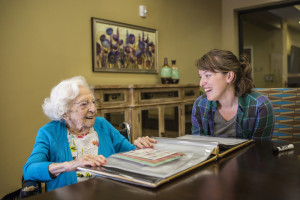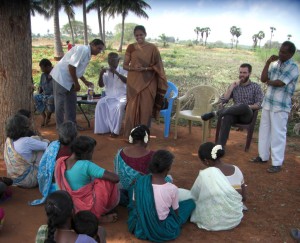Field Practicum, a distinct yet integral part of the MSSW curriculum, provides students with the opportunity to build, apply and integrate knowledge from all areas of the curriculum within a practice setting.

Ellen Line with a client at her internship with Jewish Family Services. Photo by Martin do Nascimento.
Field assignments are based on an assessment of educational needs, agency requirements, and the student’s areas of interest. Although a car is not required, field options may be more limited without access to a vehicle. The Steve Hicks School of Social Work maintains field education relationships with a diverse group of more than 400 agencies. Read about students’ field experiences in some of these agencies here.
FIRST FIELD PRACTICUM: students are placed in social service agencies under the supervision of master’s level social workers. Students learn generalist practice methods utilized in working with individuals, groups, families, organizations, and communities. They carry a caseload of 3-6 clients, facilitate or co-facilitate groups, and complete administration and planning projects. Students typically spend 16-20 hours each week in their field placements, and attend classes the other weekdays.
Students admitted to part-time or full-time extended study begin the field experience in their second academic year. Part-time or extended study students generally need to have a minimum of 8 weekday, daytime hours available (one full day or two half-days) of the 16 total weekly clock hours, while in the first placement, in order to access MSSW supervision.
SECOND FIELD PRACTICUM: completed in the student’s chosen concentration, may be completed as a full-time placement (36 hours per week in the spring semester), or as an extended block placement (18 hours per week in the spring and 18 hours per week in the summer). Students choosing an extended block placement postpone their graduation date until August, but are encouraged to participate in spring commencement exercises.
INTERNATIONAL PLACEMENTS: MSSW students have the option of completing their second field practicum in international settings. The Steve Hicks School of Social Work offers established placements with international partners. Student-initiated internships at the international level are not allowed. The international placement process is competitive: students are not guaranteed a placement but instead must enter the competition in good standing within the school, no scholastic probation, and with the requisite letters of recommendation. Essays and interviews are reviewed by members of the International Committee. International internships run the same time 540 hours in the spring semester and therefore do not delay graduation. Additionally, there is no delay or disadvantage to students for applying to international field since that process occurs prior to the regular internship placement process. There is a one-time administrative fee of $1500 payable at the beginning of the internship semester. Students are well supported in preparation for and in field by the university’s Texas Global. They also participate in a weekly seminar in the fall prior of going abroad, and in weekly communication with an assigned social work faculty liaison during the spring semester. Read about student experiences in international field placements here.



